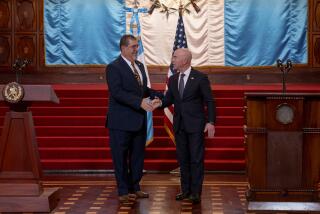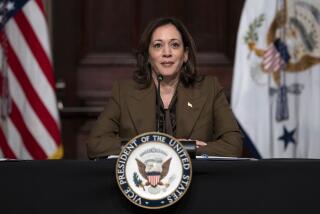Former Vice President Cheney urges ‘balance’ in U.S. response to Egyptian crisis
As protesters in Egypt continued to call for the resignation of Egyptian President Hosni Mubarak, former Vice President Dick Cheney urged U.S. leaders to remember that Mubarak was “a good man” and important friend to the United States and said he hoped that the Obama administration would seek “balance” in its approach to the fast-moving events overseas.
Cheney’s remarks came in the midst of a discussion of former President Ronald Reagan’s legacy at a panel in Santa Barbara on Saturday night. The former vice president noted that he began working with Mubarak in 1990 when he was defense secretary under President George H.W. Bush. Bush had sent him to Saudi Arabia to arrange for the deployment of U.S. forces with the goal of liberating Kuwait from the Iraqi invasion. Mubarak worked as a partner “right at the outset,” Cheney said, agreeing to allow U.S. aircraft to fly over his country and sending two divisions of the Egyptian army to fight alongside U.S. troops.
“He’s been a good friend and ally of the United States and we need to remember that,” Cheney said. “It’s also important when you get into these circumstances that you try to have an open channel of communications that is private to whoever it is you are dealing with out there. It is very hard for some foreign leader to act on U.S. advice in a visible way.”
Cheney did not overtly criticize President Obama’s approach in Egypt; his remarks came a day after Obama stopped short of asking Mubarak to step down. Obama had said “the future of Egypt will be determined by its people,” but said “there needs to be a transition process that begins now.” The administration has sought not to appear to be directing the course of events.
“There is a reason a lot of diplomacy is conducted in secret,” Cheney said Saturday night, answering questions posed to him by former Reagan aide Frank Donatelli before an audience of several hundred people at the Reagan Ranch Center. “And I think President Mubarak needs to be treated as he’s deserved over the years, because he has been a good friend, not only to the United States but a lot of other folks that we do business with.”
The former vice president said he would not predict whether Mubarak would remain in power: “There comes a time for everyone to hang it up and move on,” he said. “But as I say, that’s a decision only the Egyptians can make.”
On another brewing foreign policy matter, the former vice president said Obama’s decision to back a surge in forces in Afghanistan “was basically a plus” and he cautioned against withdrawing them too hastily. Obama had promised a withdrawal of some forces this summer.
“I would like to see the administration not get tangled up in deadlines by when they are going to start to withdraw forces,” Cheney said. “That says to the people over there in Afghanistan and in the region that the United States isn’t going to stay the course. If they just wait it out, we’ll pack it in and go home—I think that would be a big mistake and to some extent raise questions in the minds of a lot of people about the worth of American commitments and whether or not we’re prepared to do what we need to do.”
Cheney addressed the crisis in Egypt and the war in Afghanistan in the midst of a weekend program hosted by the Young America’s Foundation, a group devoted to promoting conservative ideals. The organization acquired Reagan’s Western White House, Rancho del Cielo, in 1998.
His question-answer session with Donatelli was part of a two-day program celebrating the 100th anniversary of Reagan’s birthday. The weekend was filled with warm reminiscences of Reagan’s wittiest lines, his skills as a politician and pursuits as an outdoorsman. The tone of the gathering might have been best captured by one panelist who compared Reagan to “a fine diamond” with many facets to examine.
Cheney’s avoidance of any direct criticism of the Obama administration stood in contrast to the approach of Sarah Palin, the former Alaska governor who in the conference’s opening speech Friday railed against the rise in spending under Obama. In that address, she called for a renewed focus on Reagan’s core principles of smaller government and lower taxes, never acknowledging that taxes, the size of the government, and the deficit rose under the 40th president.
Cheney, who is visibly thinner after suffering his fifth heart attack last year, took a far more measured approach. At one point he acknowledged that he understood why some conservatives were disappointed by an increase in spending under President George W. Bush.
“I think we could have done a better job on spending…I think the criticism has some justification,” he said, citing in particular the expensive Medicare prescription drug program.
But he argued that the spending on national security was necessary after the attacks of Sept. 11, 2001. “There was a lot of stuff we had to do fast and it was expensive. But we saved, in my view, thousands of lives that would have otherwise been threatened, if we had not responded as aggressively as we did.”
More to Read
Get the L.A. Times Politics newsletter
Deeply reported insights into legislation, politics and policy from Sacramento, Washington and beyond. In your inbox three times per week.
You may occasionally receive promotional content from the Los Angeles Times.







